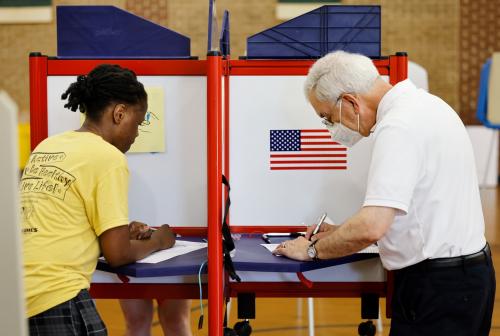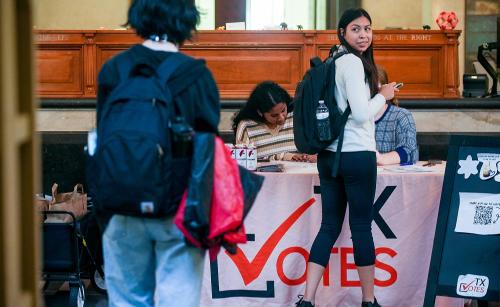The Wall Street Journal recently reported on a confidential plan within the Trump campaign to erode the independence of the Federal Reserve by involving a re-elected President Trump in interest rate decisions. The news follows reports on other Trump plans to centralize and personalize power. As I argue in a new report, further democratic erosion in the United States would have serious economic consequences. Autocrats and populist leaders measurably damage their country’s economies, and certain businesses and sectors are at particularly high risk of interference. The economic value of liberal democracy is indisputable. Economists have found that countries with populist leaders, whether on the right or left, see a 10% decline in GDP per capita over the first 15 years. Democratization increases GDP growth per capita by 20% to 25% over the following decades.
“Economists have found that countries with populist leaders, whether on the right or left, see a 10% decline in GDP per capita over the first 15 years.”
As democracy declines, nearly all businesses will therefore face substantial costs. But certain sectors and industries that face especially high risks in conditions of democratic erosion. In many of these arenas, instances of interference have already occurred in the United States.
- Businesses with high exposure to government decisions: Businesses that rely on government contracting or licensure, or that are exposed to audits or regulatory control, are particularly easy targets for would-be autocrats. For example, Viktor Orban used a license renewal process to pressure Hungary’s leading telecommunications company to shut down one of the most prominent independent news sites in Hungary.
- Businesses reliant on public investments or public services: Businesses that use government data may find data less reliable if accurate data is perceived as damaging to the party in power. In India, interference with the release of economic data led leaders of the National Statistical Commission to resign in protest. Businesses that use public services may confront discrimination in access to those goods or a decline in quality due to disinvestment.
- Businesses investing on a longer time horizon: Because of the policy instability that often accompanies democratic erosion, businesses that need to make long-term investments—for example, businesses that make difficult-to-move capital investments—are at particular risk.
- Businesses reliant on a highly educated labor force: Brain drain is already an issue in many states. Younger workers with high levels of human capital tend to gravitate to places with strong public goods provision and take political environment into account in their job searches.
- Businesses in media, entertainment, and communications: Control of public discourse is a key strategy for political leaders seeking to increase their power, and so would-be autocrats typically seek to dominate businesses in the media, entertainment, and communications sectors, including both the producers of media content and the owners of media channels and systems. In Brazil in 2021, then-President Jair Bolsonaro sought to prevent social media companies from taking down content that violated their rules.
- Businesses in science, medicine, and education: Facts can endanger an autocratic regime, either by revealing government failures or by undermining the regime’s self-justifying mythos. Businesses in the realm of science, medicine, and education are therefore likely to receive high levels of scrutiny and efforts at control. In the one-party “Jim Crow” South, for example, leaders refused to collect data on the incidence of pellagra, a disease of malnutrition, because that data would reveal the depth of Southern poverty.
- In-person businesses and businesses in tourism. Businesses that rely on customers showing up in person may see profit declines if an area experiences political or ethnic violence. The chilling effect can apply to whole neighborhoods, cities, and even states, as potential customers opt to avoid places that have developed a reputation for civil rights abuses, political instability, or political violence.
Unfortunately, it is not guaranteed that business leaders will recognize their economic interest in preserving democratic functioning. Historically, business leaders have often tragically misjudged the risks of supporting authoritarians. Business can play a crucial role in protecting democratic functioning; recognizing the dangers of democratic decline is a critical first step.





Commentary
Democratic erosion causes economic decline. Here are the 7 kinds of business at highest risk.
May 14, 2024